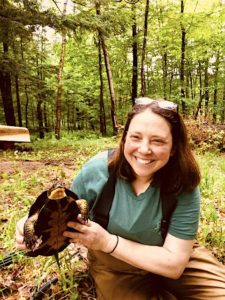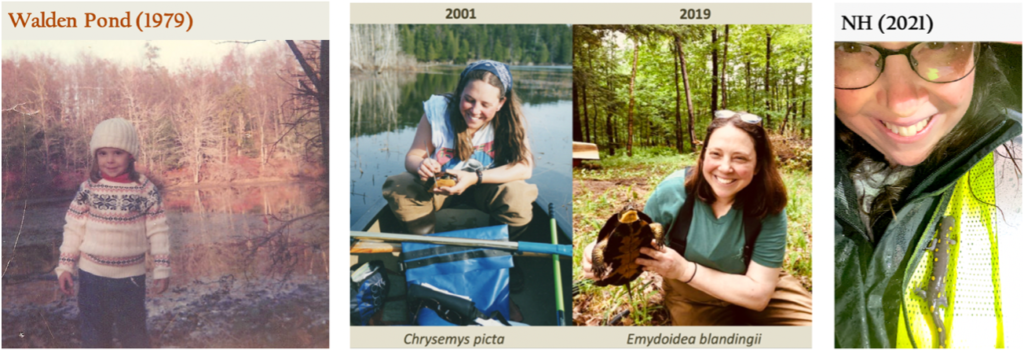 Dr. Jennifer Purrenhage
Dr. Jennifer Purrenhage
Wildlife & Conservation Biology Program
University of New Hampshire
It’s wild how much changes and how much stays the same.
I am still drawn to ‘outside’ and to transitions – spring, fall, … to change of all kinds.
I still light up when I’m snout-to-face with something wild.
I was raised on ‘Self-Reliance,’ ‘Walden,’ and ‘Song of Myself’ as bedtime stories, and I still love reading Emerson, Thoreau, Whitman, and other Romantic-Transcendentalists for nostalgic contemplation of my place in the world.
I love science and nature, but most of all I love learning. I love the feeling of curiosity, and I love sharing what I’ve learned.
I mention this because I believe it is important to know that while you follow the circuitous path ahead, you will encounter moments when you think you’re leaving your old self behind. I doubt that you are. You’re likely just turning up the volume on other parts of yourself. The foundation remains.
If your journey is anything like mine, and like those of our other friends featured here, you’ll come right back to your 4-year-old self at some point – just a slightly more ‘grown-up’ version that considers playing in the mud and wondering how the world works … a career.

I grew up in New Jersey. I’m from the part of New Jersey where that ‘Garden State’ nickname makes total sense.
I was a kid who chased butterflies, waded into ponds to catch frogs, and dissected owl pellets for fun. I was one of those kids who loved all animals and plants. I started horseback riding when I was 8 years old, and I spent most summers at a horsemanship camp in New Hampshire – a lovely place called Road’s End Farm. I have always been a wanderer, a traveler. To my family’s chagrin, I had no problem wandering far from home at an early age. The impulse to explore and seek the adventure of new places was an asset later on, as a young wildlife ecologist, when it was time to seek out a diversity of experiences.
I started my undergraduate work at the University of Wisconsin – Madison as a Psychology major.
I was a Psychology major because I wanted to study how we humans think and learn, and I wanted to be of service to other people. I still have tremendous curiosity there, but after more than 2 years of coursework, I had to switch gears and pursue a career in ecology. The pull there was strong! I graduated after 5 years with a double major in Wildlife Ecology and Biological Aspects of Conservation.
During undergrad, I spent 5 months in Costa Rica at Universidad EARTH where I studied Sustainable Agriculture & Natural Resources and fell in love with the songbirds with whom I’d migrated south for the winter. I hiked active volcanos, tracked howler monkeys, and made a lifelong friend. I received a stunningly painful bite from a bullet ant, did my best to avoid the venomous snakes we encountered daily, and never got over the poison dart frogs or the lizards that ‘walk on water.’ I took my coursework in Spanish and I dreamed in Spanish. Sadly, I lost my fluency over time. I experienced at least 15 different kinds of rain and I fully embraced ‘tico time’ and la pura vida.
During college I took road trips to explore the Western U.S. and some of our awesome National Parks. I took the Hunter Education course offered by Wisconsin DNR and learned that I’m pretty good at skeet shooting. I read a lot … Aldo Leopold, Rachel Carson, Bernd Heinrich, Ed Abbey, John Muir, David Quammen, … and everything about wolves I could get my hands on. For a while, I knew I’d become a wolf biologist (the next David Mech or Rolf Peterson!) – my heart hadn’t yet told my head that I was helplessly in love with salamanders.
The summer after my fourth year, I took my first fulltime wildlife job as a field technician on a forest songbird study in the Nicolet National Forest (Wisconsin). I spent early mornings and long days alone in the woods of “my plots” – the season started with nest searching, and then nest monitoring through the post-fledging phase. It was hard work, and I loved it. I also loved being part of a team–the field crew! We lived in truly run-down shacks, complete with mice and bunkbeds. We bathed in the lake more than we used the Forest Service showers. We had campfires. I learned a lot about birds and small-group dynamics, and field research, and data management. And I was lucky to be hired by the grad student running to project to continue working throughout my second Senior year.
Over the next couple years, I worked seasonal field technician jobs – from woodcock surveys in Northern Wisconsin to a long-term study of black-throated blue warblers in Hubbard Brook Experimental Forest in the White Mountains. After Hubbard Brook, I wanted a change—a little time away from birds and early mornings—so I took a 10-month AmeriCorps position at the Institute of Ecosystem Studies (IES, now The Carey Institute) in New York’s Hudson Valley. My job at IES was focused on native plant research, cultivation, and education, but through AmeriCorps I was exposed to many other opportunities. At the end of my AmeriCorps term, I was hired by IES, first as an environmental educator and later as a research assistant. Ultimately, I left to get back outside. I headed to Acadia National Park to spend a season as the Raptor Intern. The following year, I was hired by the Wildlife Conservation Society to conduct an inventory of the amphibians and reptiles of Acadia. That job was pivotal. Knee-deep in a bog, face to ‘face’ with a spotted salamander, I knew (and I really knew this time!) I’d found my thing.
Later that year, I was off to the University of Akron (northern OH) to begin my M.S. in Biology, on a National Science Foundation GK-12 Fellowship, followed immediately by my Ph.D. at Miami University (southern OH).
I am grateful for the four years between undergrad and grad school. I arrived in Ohio eager to begin my M.S., and with a ton of experience under my belt. My M.S. experience was great overall. I interviewed with my M.S. advisor/mentor before committing to the begin the Program. He is still a mentor to me today. I highly recommend an interview/meeting before a decision is made. It’s all about relationships.
I wasn’t sure whether I wanted to pursue a Ph.D. I really grappled with that decision. It’s not a thing you want to enter into lightly! You will work harder than you have before. You will live just outside your comfort zone. You will love and hate how hard your brain will work. You’ll doubt yourself. And you’ll gain some genuine confidence along the way. My advice is to ask yourself why you’re thinking about pursuing a Ph.D. And as with your M.S., choose your program and mentor wisely.
As a Ph.D. student, I thrived in the independence of my research and I fell in love with teaching. After earning my Ph.D., I was offered a postdoc (postdoctoral research associate) at UNH. A few years later, I joined the faculty in the Department of Natural Resources and the Environment. I am currently a Senior Lecturer in Wildlife & Conservation Biology. In my position, I teach a lot, which I love. I also run a few local wildlife monitoring projects with terrestrial salamanders, vernal pool-breeding amphibians, and freshwater turtles.
Most of my story has been about field work and graduate school, but there were so many key non-academic pursuits along the way. While completing my M.S. degree, I became a Certified Yoga Teacher and started teaching yoga on the side. During my postdoc, I also studied Holistic Health & Nutrition, and a few years later I started my organic tea business. And my practice and love of sketching and painting the natural world continues to grow. I think it’s important to not turn your back on the other things that call you and fulfill you. You’ll be busy, but you can do more than one thing in the world.